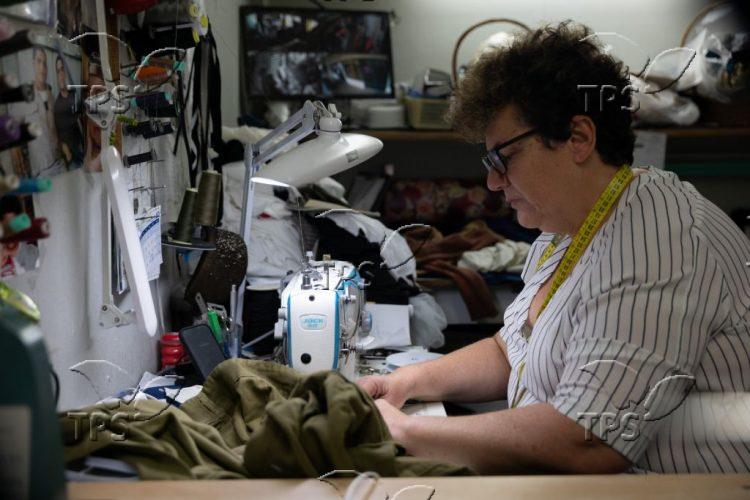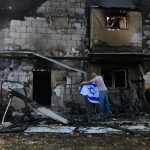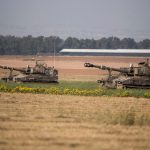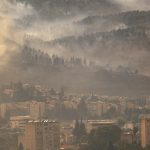‘We Refuse to Be Refugees in Our Own Country’: Kiryat Shmona Residents Ride Out War
Jerusalem, 7 April, 2024 (TPS) -- After six months of war, Kiryat Shmona is almost a ghost town. Since October 7, over 85% of the northern Israeli city’s 24,000 people left in a hurry, fleeing Hezbollah’s daily rocket attacks on the Upper Galilee.
Hezbollah leaders have suggested that they will continue to fire rockets to prevent thousands of residents of northern Israel from returning to their homes. Israeli officials have been calling for Hezbollah to be disarmed and removed from Southern Lebanon in accordance with UN Security Council resolution 1701, which ended the 2006 war.
Today, Kiryat Shmona is mostly inhabited by soldiers and a handful of residents who chose to remain. Several explained to The Press Service of Israel what they are doing and why they chose to stay.
The Seamstress

Seamstress Irena Maman fixes an Israeli army uniform in the Upper Galilee city of Kiryat Shmona. Photo by Erez Ben Simon/TPS
As a seamstress, Irena Maman made the decision to keep her tailor shop open for 12 hours a day, from morning until evening, all to provide necessary service to hundreds of soldiers who came to the Upper Galilee. Maman provides them with solutions for various uniform ’emergencies’ and going above and beyond to fulfill their requests.
“I’m determined to stay here and support the soldiers so that they don’t feel like they’re in a ghost town. I believe that those of us who can should be here to assist them in any way we can,” she says with conviction.
“A soldier came to me with these pants coming up to her chest,” Maman said as she made an adjustment to uniform trousers in her sewing machine. “I will fix that for her so it will be proper.”
Maman’s 13-year-old son is staying in town with her, resiliently adapting to life under constant rocket attacks. His two older siblings were called up to serve in the reserves.
Maman, arrived in Israel from Ukraine more than 30 years ago and is unwavering in her decision to stay.
“I already ran away from Ukraine once because I was afraid to walk around there with an identity card that said I was Jewish,” Maman explains. “Here, I want to feel like a free person. I will make decisions about my life.”
As her fingers make another adjustment to the uniform, she adds, “For those who leave Kiryat Shmona, I believe that’s how we lose the war. This is our home. Why should we spend half a year away from our houses, without jobs and schools for our children? We refuse to be refugees in our own free country.”
The Rabbi
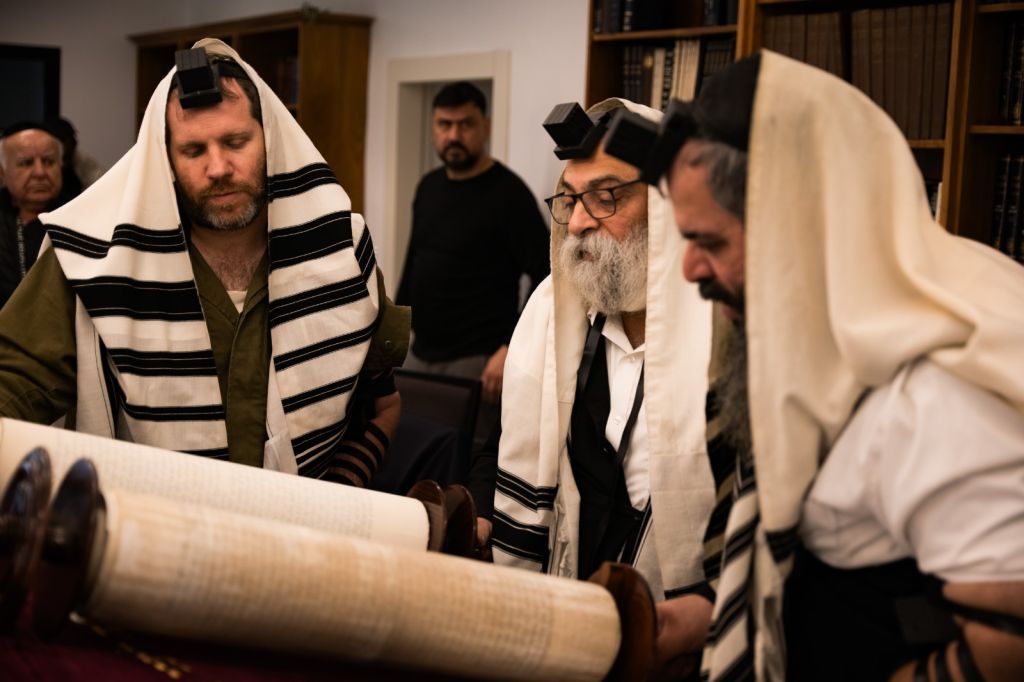
Rabbi Yigal Tzipori leads prayer services in the Upper Galilee city of Kiryat Shmona. Photo by Erez Ben Simon/TPS
Rabbi Yigal Tzipori grapples with the absence of his thriving, close-knit community. Maintaining daily prayer services with a quorum of 10 men is daunting.
“I try to call and talk to the evacuated members of the community, but it’s really not like the way it used to be,” he tells TPS-IL. “When we were here as one community, all the members together. And that is the biggest difficulty right now for me.”
Staying in town to uphold Jewish life remains Rabbi Tzipori’s top priority. Of crucial importance, he says, is providing support to the troops in the area sent to reinforce the border.
“Our activity has always been with the soldiers, even more so now in a state of war,” Tzipori says. “And soon there will probably also be fighting inside Lebanon, which is clearly necessary. We are in continuous contact with the units, assisting them and providing portions of hot food for Shabbat, assistance with equipment for Shabbat, and all the Jewish needs for soldiers. My Torah books are scattered all over the area here where there are soldiers in assembly areas,” Rabbi Tzipori explains.
“We do everything so that the IDF soldiers have the best conditions so that they only have to deal with fighting the enemy.”
The Kebab Man
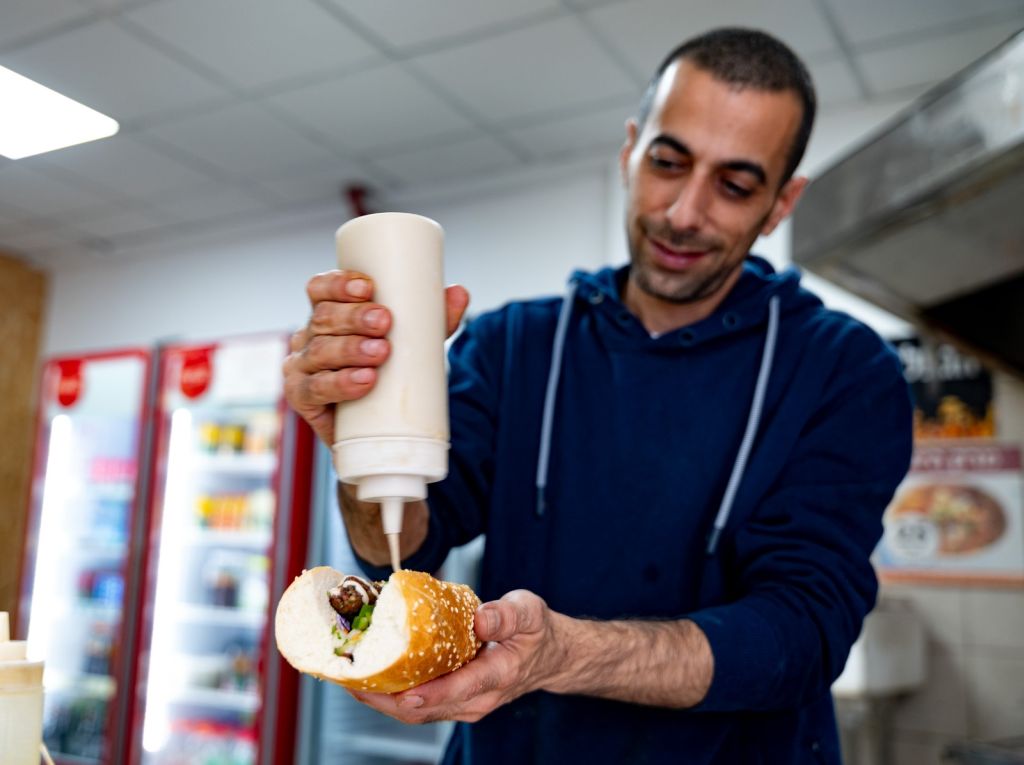
Tomer Oved prepares free food for soldiers in the Upper Galilee city of Kiryat Shmona. Photo by Erez Ben Simon/TPS
Tomer Oved is the proud owner of “Oved’s Kebab,” a small and steadfast eatery feeding comforting streetfood to soldiers and locals alike.
“We remained as a mission to the soldiers,” Tomer says with a smile. “There was no much order in the first weeks regarding the food supply, so we donated 80 percent of our rations to the soldiers. After that, we connected to the situation where we are open here with the soldiers and residents who remained. We felt it was a top value. It feels good and right to me.”
Oved is keeping the business open as usual, providing 40 to 50 portions a day, most of them to soldiers, who he refuses to charge.
“When you see them, they give you sense of confidence and security, but on the other hand you feel sorry for them. They are here all the time. Once in a while they go home for a brief visit,” he explains.
“And the conditions here are not easy. It was a cold winter,” he adds.
“My heart goes to them, it’s hard to see them going through the most difficult time that the State of Israel has ever gone through, and they are at the front.”

